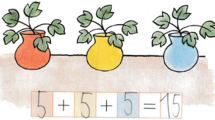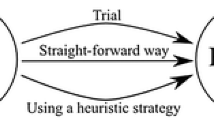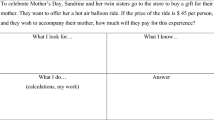Abstract
We conducted a 7-month video-based study in two sixth-grade classrooms focusing on teachers’ metacognitive and heuristic approaches to problem solving. All problem-solving lessons were analysed regarding the extent to which teachers implemented a metacognitive model and addressed a set of eight heuristics. We observed clear differences between both teachers’ instructional approaches. Besides, we examined teachers’ and students’ beliefs about the degree to which metacognitive and heuristic skills were addressed in their classrooms and observed that participants’ beliefs were overall in line with our observations of teachers’ instructional approaches. In addition, we investigated how students’ problem-solving skills developed as a result of teachers’ instructional approaches. A positive relationship between students’ spontaneous application of heuristics to solve non-routine word problems and teachers’ references to these skills in their problem-solving lessons was found. However, this increase in the application of heuristics did not result in students’ better performance on these non-routine word problems.


Similar content being viewed by others
Notes
The relevant parts are indicated in bold.
References
Blum, W., & Niss, M. (1991). Applied mathematical problem solving, modelling, applications, and links to other subjects—state, trends, and issues in mathematics education. Educational Studies in Mathematics, 22(1), 37–68.
Boaler, J., & Greeno, J. G. (2000). Identity, agency and knowing in mathematics worlds. In J. Boaler (Ed.), Multiple perspectives on mathematics teaching and learning (pp. 171–200). Wesport, CT: Ablex Publishing.
Boone, M., D’haveloose, W., Muylle, H., & Van Maele, K. (n.d.). Eurobasis 6. Brugge: Die Keure.
Burkhardt, H. (1994). Mathematical applications in school curriculum. In T. Husén & T. N. Postlethwaite (Eds.), The international encyclopedia of education (2nd ed., pp. 3621–3624). Oxford: Pergamon Press.
Cobb, P., & Hodge, L. (July 2002). Learning, identity, and statistical data analysis. Paper presented at the sixth international conference on teaching statistics (ICOTS 6), Cape Town, South Africa.
Cobb, P., Gresalfi, M., & Hodge, L. (2009). An interpretative scheme for analyzing the identities that students develop in mathematics classrooms. Journal for Research in Mathematics Education, 40(1), 40–68.
Cohen, J. (1988). Statistical power analysis for the behavioral sciences. Hillsdale, NJ: Lawrence Erlbaum Associates, Inc.
De Corte, E., Verschaffel, L., & Masui, C. (2004). The CLIA-model: A framework for designing powerful learning environments for thinking and problem solving. European Journal of Psychology of Education, 19(4), 365–384.
Depaepe, F., De Corte, E., & Verschaffel, L. (2007). Unraveling the culture of the mathematics classroom: A videobased study in sixth grade. International Journal of Educational Research, 46(5), 266–279.
Depaepe, F., De Corte, E., & Verschaffel, L. (2009a). Analysis of the realistic nature of word problems in current elementary mathematics education. In L. Verschaffel, B. Greer, W. Van Dooren, & S. Mukhopadhyay (Eds.), Words and worlds: Modelling verbal descriptions of situations. Rotterdam, The Netherlands: Sense Publishers.
Depaepe, F., De Corte, E., & Verschaffel, L. (2009b). Teachers’ approaches towards word problem solving: Elaborating or restricting the problem context. Teaching and Teacher Education. doi:10.1016/j.tate.2009.03.016.
Depaepe, F., De Corte, E., & Verschaffel, L. (2009c). Coping with authority in mathematics classrooms: Evidence from an in-depth case study in two sixth-grade classrooms. Teaching and Teacher Education (submitted).
Desoete, A. (2007). Evaluating and improving the mathematics teaching–learning process through metacognition. Electronic Journal of Research in Educational Psychology, 5(3), 705–730.
Dignath, C., Buettner, G., & Langfeldt, H. P. (2008). How can primary school students learn self-regulated learning strategies most effectively? A meta-analysis on self-regulation training programmes. Educational Research Review, 3(2), 101–129.
Fan, L., & Zhu, Y. (2007). From convergence to divergence: The development of mathematical problem solving in research, curriculum, and classroom practice in Singapore. ZDM. The International Journal on Mathematics Education, 39(5–6), 491–501.
Flavell, J. H., Miller, P. H., & Miller, S. A. (2002). Cognitive development (4th ed.). Upper Saddle River, NJ: Prentice Hall.
Fullan, M. (2000). The return of large-scale reform. Journal of Educational Change, 1(1), 5–27.
Hegarty, M., Mayer, R. E., & Monk, C. A. (1995). Comprehension of arithmetic word problems: A comparison of successful and unsuccessful problem solvers. Journal of Educational Psychology, 87(1), 18–32.
Hohn, R. L., & Frey, B. (2002). Heuristic training and performance in elementary mathematical problem solving. The Journal of Educational Research, 95(6), 374–380.
Kramarski, B., & Mevarech, Z. R. (2003). Enhancing mathematical reasoning in the classroom: The effects of cooperative learning and metacognitive training. American Educational Research Journal, 40(1), 281–310.
Lester, F. K., Jr. (1994). Musings about mathematical problem-solving research: 1970–1994. Journal for Research in Mathematics Education, 25(6), 660–675.
Lester, F. K., Garofalo, J., & Kroll, D. L. (1989). The role of metacognition in mathematical problem solving: A study of two grade seven classes (Final report, NSF project MDR 85-50346). Bloomington: Indiana University, Mathematics Education Development Center.
Mason, J. (2001). Modelling modelling: Where is the centre of gravity of-for-when teaching modelling? In J. F. Matos, W. Blum, S. K. Houston, & S. P. Carreira (Eds.), Modelling and mathematics education. ICTMA 9: Applications in science and technology (pp. 39–61). Chichester, UK: Horwood.
Mevarech, Z., & Amrany, C. (2008). Immediate and delayed effects of meta-cognitive instruction on regulation of cognition and mathematics achievement. Metacognition and Learning, 3(2), 147–157.
Mevarech, Z., & Fridkin, S. (2006). The effects of IMPROVE on mathematical knowledge, mathematical reasoning and meta-cognition. Metacognition and Learning, 1(1), 85–97.
Ministerie van de Vlaamse Gemeenschap. (2001). Ontwikkelingsdoelen en eindtermen. Informatiemap voor de onderwijspraktijk, gewoon basisonderwijs [Educational standards for the elementary school. Information folder for the educational practice]. Brussels, Belgium: Departement Onderwijs.
Muis, K. R. (2008). Epistemic profiles and self-regulated learning: Examining relations in the context of mathematics problem solving. Contemporary Educational Psychology, 33(2), 177–208.
NCTM. (2000). Principles and standards for school mathematics. Reston, VA: National Council of Teachers of Mathematics.
Remillard, J. T. (2005). Examining key concepts in research on teachers’ use of mathematics curricula. Review of Educational Research, 75(2), 211–246.
Schoenfeld, A. H. (1985). Mathematical problem solving. New York: Academic Press.
Schoenfeld, A. H. (1992). Learning to think mathematically: Problem solving, metacognition, and sense making in mathematics. In D. A. Grouws (Ed.), Handbook of research on mathematics teaching and learning (pp. 334–371). New York: Macmillan.
Spillane, J. P., Reiser, B. J., & Reimer, T. (2002). Policy implementation and cognition: Reframing and refocusing implementation research. Review of Educational Research, 72(3), 387–431.
Van Dooren, W. (2005). The linear imperative: A search for the roots and an evaluation of the impact of the over-use of linearity [Unpublished doctoral dissertation]. Leuven: University of Leuven.
Veenman, M. V. J., Van Hout-Wolters, B. H. A. M., & Afflerbach, P. (2006). Metacognition and learning: Conceptual and methodological considerations. Metacognition and Learning, 1(1), 3–14.
Verschaffel, L., De Corte, E., Lasure, S., Van Vaerenbergh, G., Bogaerts, H., & Ratinckx, E. (1999). Learning to solve mathematical application problems: A design experiment with fifth graders. Mathematical Thinking and Learning, 1(3), 195–229.
Verschaffel, L., Greer, B., & De Corte, E. (2000). Making sense of word problems. Lisse, The Netherlands: Sweits & Zitlinger.
Voigt, J. (1985). Patterns and routines in classroom interaction. Recherches en Didactique des Mathematiques, 6(1), 69–118.
Wilson, J., & Clarke, D. (2004). Towards the modelling of mathematical metacognition. Mathematics Education Research Journal, 16(2), 25–48.
Acknowledgments
The authors are grateful to the reviewers for their constructive comments on earlier versions of this manuscript.
Author information
Authors and Affiliations
Corresponding author
Rights and permissions
About this article
Cite this article
Depaepe, F., De Corte, E. & Verschaffel, L. Teachers’ metacognitive and heuristic approaches to word problem solving: analysis and impact on students’ beliefs and performance. ZDM Mathematics Education 42, 205–218 (2010). https://doi.org/10.1007/s11858-009-0221-5
Accepted:
Published:
Issue Date:
DOI: https://doi.org/10.1007/s11858-009-0221-5




